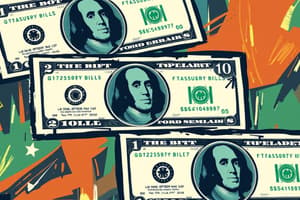Podcast
Questions and Answers
How do borrowers benefit from money markets?
How do borrowers benefit from money markets?
- They gain access to high-interest loans
- They can acquire long-term financing options
- They can avoid paying interest entirely
- They receive a low-cost source of temporary funds (correct)
Which instrument is a short-term security issued by the government?
Which instrument is a short-term security issued by the government?
- Repurchase Agreements
- Corporate Bonds
- Fed Funds
- Treasury Bills (correct)
What is the primary purpose of money markets for investors?
What is the primary purpose of money markets for investors?
- To provide long-term investment opportunities
- To warehouse surplus funds for short periods (correct)
- To achieve high returns on investment
- To invest in real estate and commodities
When purchasing a 28-day T-bill for $996.37 that is worth $1,000 at maturity, what does the investor receive?
When purchasing a 28-day T-bill for $996.37 that is worth $1,000 at maturity, what does the investor receive?
What type of bids does the Treasury accept during T-bill auctions?
What type of bids does the Treasury accept during T-bill auctions?
What do financial institutions use Fed Funds for?
What do financial institutions use Fed Funds for?
How long are Fed Funds typically transferred between financial institutions?
How long are Fed Funds typically transferred between financial institutions?
What is a key characteristic of money market securities?
What is a key characteristic of money market securities?
Who can participate in Repurchase Agreements?
Who can participate in Repurchase Agreements?
What is one reason for the growth of money markets compared to banks in the 1970s and 1980s?
What is one reason for the growth of money markets compared to banks in the 1970s and 1980s?
Why do money markets have a cost advantage over banks?
Why do money markets have a cost advantage over banks?
Who primarily participates in money markets?
Who primarily participates in money markets?
What common financial instrument is typically associated with money markets?
What common financial instrument is typically associated with money markets?
What impact did rising interest rates have on depositors during the 1970s and 1980s?
What impact did rising interest rates have on depositors during the 1970s and 1980s?
How does the maturity period of money market securities differ from traditional securities?
How does the maturity period of money market securities differ from traditional securities?
Which statement best describes the regulatory environment of banks compared to money markets?
Which statement best describes the regulatory environment of banks compared to money markets?
What is a defining characteristic of the Eurodollar market?
What is a defining characteristic of the Eurodollar market?
How can an importer in Botswana use a banker's acceptance?
How can an importer in Botswana use a banker's acceptance?
Why do money market instruments typically have relatively lower interest rates?
Why do money market instruments typically have relatively lower interest rates?
What role does the money market play in an economy?
What role does the money market play in an economy?
Which statement best describes the financial security assessment required for exporters?
Which statement best describes the financial security assessment required for exporters?
What is the primary purpose of a repo agreement?
What is the primary purpose of a repo agreement?
What is a characteristic of negotiable certificates of deposit?
What is a characteristic of negotiable certificates of deposit?
What led to the significant increase in the use of commercial paper in the early 1980s?
What led to the significant increase in the use of commercial paper in the early 1980s?
What advantage does a banker’s acceptance provide to exporters?
What advantage does a banker’s acceptance provide to exporters?
Which of the following best describes commercial paper?
Which of the following best describes commercial paper?
Which factor is most likely to contribute to the difference in rates between commercial paper and Treasury securities?
Which factor is most likely to contribute to the difference in rates between commercial paper and Treasury securities?
What potential risk do banker’s acceptances eliminate for exporters?
What potential risk do banker’s acceptances eliminate for exporters?
How are banker’s acceptances primarily utilized in international trade?
How are banker’s acceptances primarily utilized in international trade?
Flashcards are hidden until you start studying
Study Notes
Money Market Instruments
- Money market securities are typically sold in large denominations, have low default risk, and mature within one year, most maturing within 120 days. These securities are so close to money that they are sometimes referred to as close substitutes for money.
- T-bills are auctioned to dealers where the US Treasury Department accepts both competitive and noncompetitive bids. The price that everyone pays is determined by the highest yield paid to any accepted bid.
The Purpose of Money Markets
- Investors use Money Markets as a safe place to store surplus funds for short periods.
- Borrowers use Money Markets to acquire low-cost, temporary funding.
- Corporations and governments use these markets to cover discrepancies in cash inflows and outflows.
Money Market Participants
- Participants in the money market include Commercial Banks, Federal Agencies, Non-Financial Corporations, and individuals, among others.
Money Market Instruments
- Treasury Bills are short-term government securities with 28-day to 12-month maturities.
- Fed Funds are funds transferred, or loaned, between financial institutions, usually for a period of one day, and are used by banks to meet short-term reserve requirements.
- Repurchase Agreements are similar to Fed Funds, but allow for nonbank participation. A firm sells Treasury securities with the agreement to buy them back within a set time frame, usually 3-14 days, for a certain price. Repurchase Agreements are effectively short-term collateralized loans.
- Negotiable Certificates of Deposit are bank-issued, documented deposits that specify the interest rate and maturity. The denominations range from $100,000 to $10 million and are known as Fixed Deposits in Botswana.
- Commercial Paper is unsecured promissory notes issued by corporations with a maturity period of no more than 270 days.
- Banker's Acceptances are orders to pay a specified amount to the bearer on a set date if certain conditions are met, typically delivery of goods. They are commonly used when buyers and sellers of expensive goods live in different countries. An active secondary market for Banker's Acceptances exists until they mature.
- Eurodollars are deposits of U.S. dollars held in banks outside of the United States.
Comparing Money Market Securities
- The Money Market is a mechanism for warehousing surplus funds for short periods and provides low-cost temporary funding.
- Money market instruments typically have relatively lower interest rates compared to longer-term securities. The reasoning behind this is that shorter maturities tend to hold a lower level of default risk and require less of a compensation premium demanded by lenders.
Botswana Applications
- Governments, such as that of Botswana, can utilize the money market as a tool to implement and manage monetary policy.
- Importers in Botswana can utilize a Banker's Acceptance to facilitate transactions with foreign parties.
Studying That Suits You
Use AI to generate personalized quizzes and flashcards to suit your learning preferences.




